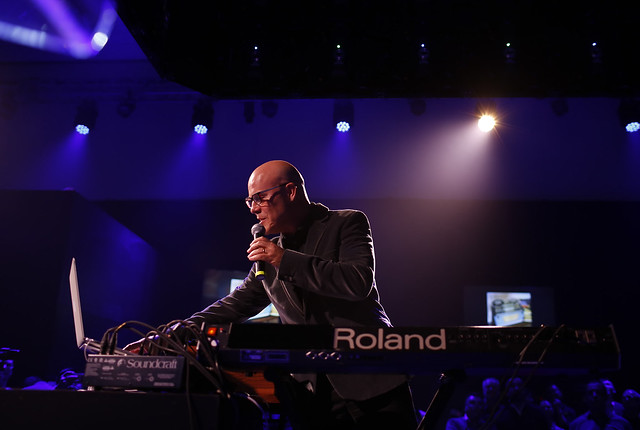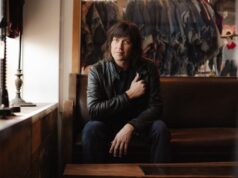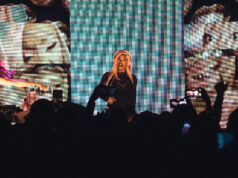
Thomas Dolby (Photo courtesy conqueroo)
On July 27, Thomas Dolby will release a 2-CD greatest hits collection, titled Hyperactive, as part of BMG’s Masters Collection series. Along the way, Thomas will tour — well, it may perhaps be more accurate to say that he will present a series of musical experiences and reflections! In a tour to begin this week, members of the audience will pick songs from Thomas’ 30-year catalog for him to perform, and he also will tell stories behind each song, including anecdotes and musical composition. Each show will be a unique and totally immersive experience.
Locally, Thomas will visit The Birchmere for “An Evening of Music and Storytelling” on Monday, July 30. Parklife DC caught up with Thomas recently to discuss the tour, reflections on roughly 30 years of making music, and his current life in Baltimore as a professor at Johns Hopkins University.
Mickey McCarter: What can you tell us about the upcoming tour? It sounds like you have something very different than a traditional concert experience in mind.
Thomas Dolby: Yes, it’s going to be very different. I’m going to be playing solo. I will be unstitching some of my best-known songs, talking about how I wrote them, exploring the melodies, and explaining how the sounds and the grooves were put together.
I’ll share some anecdotes behind the recordings and evolution of the songs, and I’m going to allow the audience to pick which songs I will perform, so every night will be very different.
MM: I cannot help but think of your role as a professor at Johns Hopkins and how this is a scholarly approach to your own music!
TD: I find people have an appetite for that really. They like it when you lift the lid on your work.
I’m going to be 60 this year. And I think a lot of senior or legacy artists have a hard time being sincere and vulnerable about how it feels to age as an artist. In the field of pop music, it’s really the young’uns have the energy in both performing and attending gigs. So I think for a lot of musicians of my generation, it’s a case of how can you play this retro card and take people for a walk down memory lane?
I find that a little deluding somehow. It’s like an admission that nothing I possibly could do these days could be of as much interest as reliving the glories of the past. So, I tend to avoid these Rewind-type shows. But at the same time, I’ve been teaching and I’ve been writing, so I’m very much in the mode to deconstruct and analyze and to interact with my audience about what’s going on behind the scenes in the music. That’s the approach I’ve decided to take for these shows.
MM: If I may, I have two reactions to that. When I get to talk to gentlemen like yourself, I am always struck that you produced these great works of art. You wrote amazing pop songs. And like any piece of art, it deserved to be admired, regardless of when it was created, I would say.
Second, it’s interesting that as an artist matures, you get the perspective of the more mature person writing and making music. Do you have any thoughts to that?
TD: I think music is a bit different from, say, painting. If you’re a painter or a sculptor, and you did something 30 years ago that still has value, yes, we can admire it and share in that admiration.
But physically and vocally, you change as you get older. Your voice changes, and as a performer, you are in a very different place than you were when you wrote that thing. And the audience is in a different place as well. Yes, they can relive the memories of the way their lives were when the song first came out, but they have changed too. So, for the song to still have relevance and resonance with them several decades later, it’s necessary for the song to evolve past where it was when you recorded it and released it.
That was a snapshot of that song early in its evolution. If a song has survived and still has meaning today, then it must evolve both for the artist and the audience.
Watch the official music video for “Hyperactive!” by Thomas Dolby on YouTube:
[youtube https://www.youtube.com/watch?v=rmGxh1FhtxE]
MM: Since this is a career retrospective, you have had quite a career not just for yourself but supporting other artists. I was blown away when I saw you perform previously at The Birchmere with your band, and you said, “We’re the band that supported David Bowie during Live Aid.”
Given that we are looking back on your career, is there something where you worked with or supported someone else that really stands out to you? [Editor: I confessed to Thomas that I had not read his book, The Speed of Sound: Breaking the Barriers Between Music and Technology: A Memoir, published in 2016 by Flatiron Books.]
TD: My career is the sum of several very disparate parts. I was never so focused on my work as a solo artist that I would turn my back on opportunities to collaborate and work with other musicians, especially when they remain teenage heroes. It was an incredible honor to have met many of my heroes and have the opportunity to work with them.
When the boot is on the other foot — when I’ve asked people like Eddie Van Halen or Jerry Garcia and Bob Weir to play on a record of mine, I notice they try to “sound like Thomas Dolby.” But in my mind, I thought it would work out that they would “sound like them,” but on my record. If I work with someone else, like Joni Mitchell or George Clinton, it’s the wrong move to make to try to be a Joni imitator.
That can work for or against you. In the case of Joni for example, it never really clicked between us, which was a big disappointment for me because she was such a huge influence. In many other cases, something great came out of collaborations that I couldn’t possibly have anticipated. You have to throw caution to the wind when you really collaborate like that.
In Bowie’s case, that came about in a weird way. It came together very rapidly. His regular band — Carlos Alomar, Earl Slick, and the others — were all busy with other projects. Bowie decided, very much to his credit I think, decided to work with a young English band who were not seasoned session musicians. If he had wanted to just supplant his regular touring band with some expert musicians who could fill in, then he certainly had the opportunity to do that. But instead, he went for a band that were not session players. All of us in that band had our own thing going on whether it was from Prefab Sprout or from my side.
So, in the week or so we had to put the songs together, Bowie allowed us the lattitude to come up with our own versions. He never pushed back and said, “That’s not the way you play it” or “You should play it like this” or “You should listen to this tape” or “You should sound like this guy.” He let it evolve organically. And that was very much to his credit.
MM: Let’s talk a bit about your work at Johns Hopkins. You’ve transitioned into a new role, I believe? Can you tell us about what you’re doing and what you’ve accomplished there?
TD: I went there to help launch a film and media center. It was a gift to Johns Hopkins to open this center in a pretty rundown part of Baltimore, which is re-emerging as an arts district. We took an old art deco cinema and turned it into a state of the art film and media teaching center, along with a local arts college MICA. They needed someone to evangelize the new program and design the audio aspects of the space — we have a very high-end recording studio in there as well as a dozen editing suites — and also the curriculum.
Johns Hopkins has an arts side as well as its better-known science and medicine side, but in the film program had been very academic before I got there. Now, three years later, it’s a full-fledged production and film school, where there are students making their own independent zombie features and getting them shown at Sundance. It moved quite rapidly in a short period of time.
So, that was only ever supposed to be a three-year engagement, and during that time, I was teaching film and TV scoring, but only a semester at a time as an elective. I like Baltimore a lot, and my wife and I got very settled there, and I was very excited about the university and my teaching role. So, I invented a new direction for myself at the Peabody Institute, which is Johns Hopkins’ music conservatory. It’s actually the oldest in the USA, and it was established in the mid-1900s. They really needed to evolve this conservatory into a 21st Century organization. Because classical music is not in a great place as an industry these days, the institution was graduating far more brilliant musicians than there were jobs for in the professional orchestral world. And they asked me to help them figure out how to define new career paths for their graduates.
I’ll be teaching film and TV music there, but more importantly things like virtual reality and new applications of music and sound. That’s really building and companies like Microsoft and Apple and Sony and Google are really pushing it, so it’s going to happen.
My students from Peabody will be among the first flight of students to graduate from a major university with qualifications in spatial audio and adaptive music composition and this whole new set of skills that have become important because of the speed with which technology is developing.
MM: From here in DC, I’ve had the opportunity to encounter you in your life as an artist in Baltimore. Outside of your performances, I saw your first DJ gig in Baltimore and I saw you interview Amanda Palmer in her book talk at the Sixth & I Synagogue. And it’s great to see you, Thomas Dolby, as part of our greater local community.
Are you going to continue to do things like that and be involved and visible?
TD: Baltimore is a great city with serious problems. But one of the things I love about it is that everyone you talk to is actively involved in tackling those problems. It’s amazing. Everyone I talk to is coaching soccer, or helping out at their local church, or doing something good. And it’s just amazing how people get involved. After living in cities like London and Los Angeles and New York, where frankly a lot of people are just looking out for #1, I love that Baltimore is small enough of a town that if you bump into somebody, you are going to see them around again on the weekend at an arts opening. People take an active interest in what you’re doing, and they want to help. They want to figure out how to hop onto your bandwagon.
So, it’s been a pleasure to become part of the greater community, as you say. And Baltimore’s proximity to DC, Philadelphia, and New York makes it geographically attractive. It’s a city that is right on the cusp of re-emerging as a force. It reminds me so much of a lot of British ports like Liverpool, Newcastle, Bristol, and Glasgow. Fifteen or 20 years ago, those cities were very rundown with boarded up buildings and the like. When you are in the thick of it, it’s very hard to imagine things are going to change. But I’ve seen how rapidly those cities have changed in the UK, and they are absolutely buzzing now with great arts centers and a fantastic creative vibe. I would like to be a part of the rebirth of Baltimore.
MM: Has your new home inspired any new music?
TD: I wish. It would be great if it did! I tend to be very governed by the light at the end of the tunnel. If I had a deal to make an album by the end of the year or if I had a major tour booked, then it would definitely be conducive to creating some new music.
My teaching at the moment keeps me pretty busy, and that’s OK. The gaps between my albums have been so huge, they fall into comeback territory! Fortunately, my fans are used to a long wait, and every day I get messages saying, “Thomas, you have to make some new music.” I take it with a grain of salt! I’m not done with music, but right now my energies are going into my teaching.
***
For a full list of concert dates, visit http://www.thomasdolby.com. For The Birchmere show in Alexandria, Virginia, buy your tickets online!
Thomas Dolby: An Evening of Music and Storytelling
The Birchmere
Monday, July 30
Doors @ 7:30pm
$35
All ages






